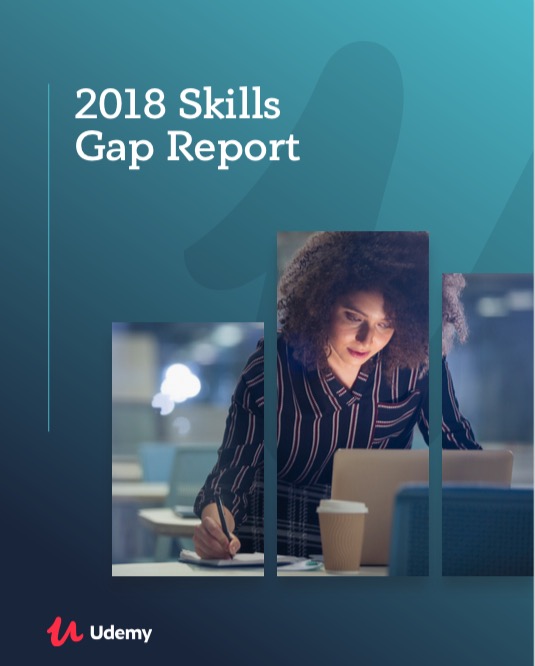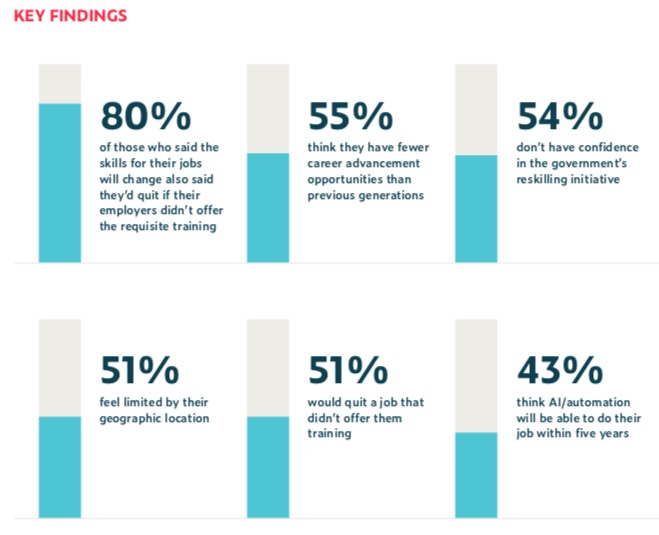
20 Nov, 2018
Report Finds Workers Increasingly Aware of Digital Skills Gap, Yet Optimistic about the Future
SAN FRANCISCO–(BUSINESS WIRE)–November 19, 2018 – Udemy, the global marketplace for learning and teaching online, today released the “2018 Skills Gap Report,” the company’s third survey asking full-time workers directly how they feel about digital transformation and what, if anything, they’re doing to prepare and respond to workplace changes.
According to the Udemy research, awareness is increasing around the skills gap and how automation and artificial intelligence will impact jobs. But, rather than see these trends as threats, most workers feel good about their prospects and continue to believe that if they work hard, they will be successful.

“Amid current challenges in the global economy, self-motivated knowledge seekers are taking steps to prepare for what’s ahead, even though there’s no consensus on what the future of work will hold,” said Llibert Argerich Villaespesa, Vice President of Marketing at Udemy. “More than ever, job skills are changing rapidly. To keep pace with those increasingly unpredictable changes, the most important skill workers can bring to the table is the ability to continuously learn.”
U.S. Skills Gap Awareness Grows; Self-Motivation Does Too
The contrast between job-seekers’ skills and the qualifications demanded by employers has grown starker: 84% percent of U.S. workers believe there is a skills gap (up 6% from 2017) and 39% feel personally affected by it (up 4%).
Looking closer, those who recognize the urgency to upskill are already doing what it takes to stay relevant in a fast-moving job market and expect employers to provide training to help bridge the gap. Men and millennials/Gen Z feel the skills gap effect most strongly and are more apt to have undertaken some form of upskilling:
(+) 80% of those who said the skills for their jobs will change also said they’d quit if their employers didn’t offer the requisite training.
(+) 73% say they’ve already had to gain additional skills to do their jobs.
(+) 51% would quit a job where they weren’t offered training.
(+) Men (47%) feel more personally affected by the skills gap than women (31%).
(+) Millennials/Gen Z (47%) feel more personally affected by the skills gap than workers ages 38+ (30%).
(+) 34% are taking online courses as their primary resource for learning new skills.

Trends Hold Across Countries Surveyed
Sentiments from U.S. workers are echoed in other key global markets, based on similar surveys Udemy fielded in Brazil, France, Mexico, Portugal, and Spain. Employees in these countries agree there is a skills gap, and an increasing number of people feel affected by it. Moreover, people in all surveyed countries recognize AI/automation will have an impact on jobs within the next five years, and the skills required for existing jobs will change in that time, too.
Those who are self-motivated to seek out knowledge to better equip themselves for rapidly evolving skills have the most confidence about their future prospects:
(+) The overwhelming majority of Brazilian (93%) and Mexican (88%) workers think the skills necessary to do their job will change within five years.
(+) Portuguese workers are least likely (33%) to think automation will be able to do their job within five years, while the majority (61%) of Brazilians anticipate AI’s takeover.
(+) The Mexican workforce feels most personally affected by the skills gap (73%), followed by Brazil (72%) and Spain (62%).
(+) 93% of the French workforce believes there is a skills gap, up 12% from 2017.
(+) Majority of workers in the U.S. (65%), Brazil (86%), France (53%), Mexico (79%), Portugal (58%), and Spain (55%) expect to do better, achieve more, and/or be more economically secure than their parents.
Methodology
The online survey for the U.S. was conducted by Toluna Group on behalf of Udemy in September 2018 among more than 1,000 U.S. office workers in full-time jobs who are ages 18 or older. The complete methodology for all countries surveyed available upon request.



Liked this article? Share it!